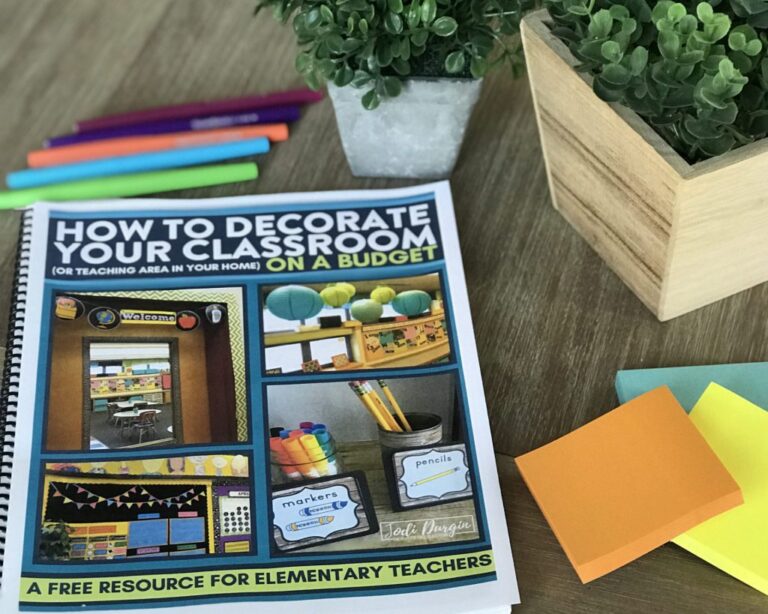Nobody goes into teaching because of the salary. Many find themselves asking, “How can I earn extra money as a teacher?” This comes out of necessity and not greed. While I can’t increase your teaching salary, I do have some tips that I’ve used with success to live debt-free. They will help you stretch your teacher paycheck further than you ever imagined. Read below to get my bet tips for how to save money as a teacher.
For as long as I can remember, I’ve wanted to be a teacher. Even at a young age, I knew teachers didn’t make a lot of money. That never affected my strong desire to become an educator. In today’s world, not only are teachers not as appreciated as they should be, but they’re also underpaid. They get well below what other professionals with similar degrees earn. Some districts have even gone as far as requiring teachers to have advanced degrees to work there. This further puts a financial burden on educators.
When I was young, I thought making $30,000+ a year sounded like a lot! Boy was I wrong! My starting salary at my first school was a little over $28,000. Money was extremely tight during that time (and the remaining time I spent at that school). I knew I should have budgeted better, but I was working long hours at work. I didn’t want to put much thought into where my money was going. Taco Bell on the way home was so much easier than cooking a whole meal for myself at 7pm.
Not only was I earning little money and spending it on things I shouldn’t have (like takeout), I was spending a horrendous amount of money on stuff for my classroom! My first year teaching, I spent close to $3,000 for things in my classroom. That was my personal money. The state I worked in didn’t reimburse any money for teachers and I could only claim $250 on my taxes.
What other profession do you know that has to buy their own supplies? Would we ask doctors to purchase their own tongue depressors, cotton balls, bandaids, or syringes? Would we ask a chef to buy their own meat and produce to cook at their restaurant? Unfortunately, until we as teachers are receiving close to what we actually deserve (wouldn’t millions be nice!?), we must learn to use what we’ve got and live one amazing life with it. This means we need to be purposeful with our teacher dollars and save money when we can.
To stretch your teacher salary as far as possible, start by looking at how much you take home each check (meaning after taxes, insurance, union dues, etc.). If you are paid more than just once a month, you’ll want to then calculate what your monthly income is. During the month, you have set expenses that you must take care of. Examples are mortgage/rent, loans, utilities, car insurance, car payment, and phone. You have variable expenses too. Examples are food, entertainment, gifts, and clothing. List all of it out and know how much that you actually have to work with. This will help you truly get more bang for your buck.
Read below to get my 10 tips for how to save money as a teacher!

10 Tips for How to Save Money as a Teacher
Below are 10 tips for how to save money as a teacher.
1. Record all expenses.
When my husband and I were working to pay off our debts and save for a house, we wrote every single expense down. This opened our eyes to where our money was going and being aware of that made our decision making easier. I never realized how much of my income was actually going to Target and craft stores until I did this! This really helped me see what was important enough to get my money. It also showed me where I should be cutting spending.
2. Determine your priorities.
Saving money will look differently from one teacher to the next. Depending on what stage you are in your life, you’ll have different priorities. Some of us have families as we are starting out in the classroom. Some of us have two incomes with a spouse. Others are fresh out of college and on our their for the first time. You have to make sure that you prioritize your needs and not compare your spending with those who are at a different stage in their life. The biggest priorities that people may have could include paying off those pesky student loans, saving up to buy your first home, preparing to have a baby, or sending your first child off to college. No matter what your priorities may be, the key is to determine the most important thing in your life at this moment and work towards that goal.
3. Save for retirement.
Fresh out of college, I never thought that I’d be saving for retirement, but it is a must! Most districts offer retirement plans where they take money out of your check each pay period and put it into your retirement account. This takes out any of the guesswork for you and you know that you’re setting yourself up for your future. The sooner you start saving up for your retirement, the better off you’ll be. You may not be able to afford that beachfront property in Maui, but you’ll be able to live semi-comfortably in your golden years. Keep reading for more ideas for how to save money as a teacher!
4. Look for ways to cut expenses.
If you have recorded all your spending (even that Dollar Store item and coffee on the way to school), it becomes easy to see where the money is going. Look for ways to trim the expenses and cut out the excess. Are you paying for gym memberships you are not using? Are you throwing away a lot of unused food regularly? Is your trash can filled with takeout containers? Do you really watch that much TV? I saved about $100 a month by cutting cable. I didn’t watch a lot of TV. Any shows I did watch were available on the network’s website or a streaming service such as Hulu.
5. Avoid impulse buys.
This is one of the harder ways to save money as a teacher, but it’s important. It used to be that an impulse buy meant going to Target for toilet paper and leaving with $65.00 worth of things that weren’t even on your radar when you walked through the automatic doors and grabbed for the big red cart. C’mon, we’ve all been there!
Now, social media is filled with pictures of trendy things that all teachers “MUST” have. We as viewers are clicking the affiliate links without hesitation. Two short days later, there is something sitting on your doorstep in a big box labeled “Prime.” It was cute, trendy, fast, and convenient to just click a button and have it mailed to you. However, it’s money that could have been spent (or saved) elsewhere.
Make a habit of instilling a 24-48 hour wait period on any purchase. If you still really NEED the item after that time and it’s in your budget, go ahead and purchase it.
6. Plan your meals and make grocery lists by the week or month.
This is my favorite way to save money as a teacher! Creating a monthly (or even weekly) menu is going to be a huge money saver. Obstacles such as “what should we have for dinner” or needing to run to the store after school often result in drive-thrus and pizza delivery nights. Make a habit of planning out all meals, including snacks and drinks, and use that menu to write a grocery list. Most importantly, stick to it! If those brownies weren’t on your list because they’re not on the menu that week, don’t buy them! Also, save your menus to make future planning easier.
7. Use one credit card.
Many experts will say to avoid using credit cards completely. I disagree. If you have the willpower to only spend what you can afford and are good about making payments on time, credit cards can be useful tools in saving money. Many credit cards offer great rewards like cash back or free flights, which will actually save you money. If you were going to spend the money using your checking account anyway, you might as well get some perks out of it and use a credit card with great rewards!
Using one card will also give you an easy way to track spending because you’ll be looking at your statement monthly. I use my card to pay any bill that will allow me to use credit instead of a check (I use it for cell phone, cable, oil, water, and electric). This earns me points towards free flights and streamlines the time it takes to pay bills. Again, this is about responsibility and is not for everyone, but can be very rewarding (depending on the credit card).
8. Set up bill payment options through your bank.
Most banks now allow you to make payments to anyone online. I have all bills that can’t be paid with a credit card set up to be paid with a quick click. I can also pay people online (that I would normally need to write a check to) quickly and easily. The bank then sends them the payment in the mail. I no longer need to write a check, find an envelope, or go to the post office. You also never have to worry about missing a payment if you set up automatic bill payments through the website or your bank, which can save you a bundle in late fees. Keep reading for more ideas for how to save money as a teacher!
9. Shop online.
I know I mentioned above to avoid those online impulse buys. However, overall online shopping feels like the best option for saving time and money as a teacher. It is easy to compare prices and get the best deal (seriously, shop the deals!). You can save on frequently-purchased items (e.g. coffee and toilet paper) and get it delivered to your door with the push of a button. You avoid impulse buys that happen when you have to walk past the Dollar Spot, clothing, shoes, and jewelry to get to the paper towels (the one item you actually needed). Each Wednesday, grocery stores upload a new weekly ad, and big box stores upload new ads on Sundays. Those are the best days to sit down and truly compare prices in relation to your menu for the week or your actual needs in other areas.
10. Beg, borrow, and steal things for your classroom.
Well, don’t steal… but do beg and borrow. Use your public library to get the books you need for class. Share resources with colleagues (especially when everyone likes to purge their closets at the beginning and end of the school year). Ask parents for donations to the classroom (Meet the Teacher at the beginning of the year is a great time for this). Apply for a donor’s choice project. Find a Facebook group for teachers where you can trade or get items for free from those who no longer need them (retiring teachers usually post everything they need to get rid of).
Let’s face it… Until we get those million dollar raises we all dream about, we need to work a bit smarter when it comes to money. Living on a teacher salary is more than possible and it doesn’t necessarily mean you can’t have any fun. As long as you know what money is coming in monthly, what needs to go out to bills monthly, and use what’s left responsibly, you will not have to stress about money (as much). Let’s be smart about money, keep calm, and teach on my friends!
We hope you found these tips for how to save money as a teacher helpful! If you liked this post, you might also like this one about how teachers can make more money.



